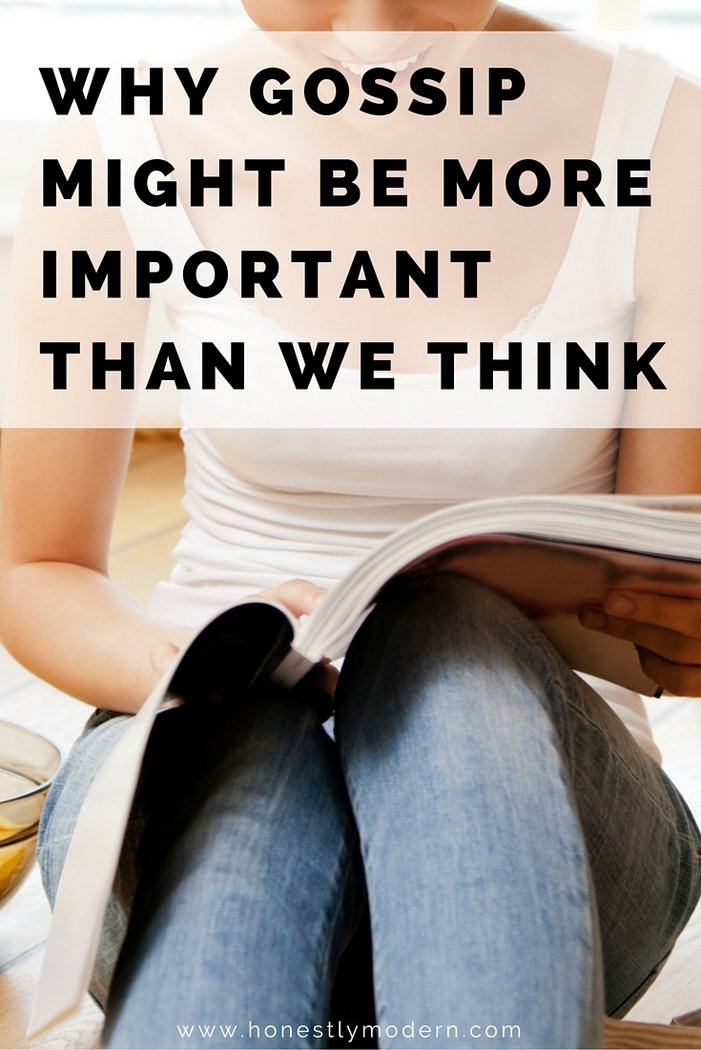Why Gossip Might Be More Important Than We Think

Last week, as I waited in line at the grocery store, I watched the woman in front of me attempt to discreetly grab a copy of a popular gossip magazine and add it to her basket. She even went so far as to very intentionally flip the magazine over so no one knew what she snagged off the shelf.
Should Gossip Magazines Be Embarrassing?
Why was she embarrassed? Should she be ashamed that she enjoys reading about the latest and greatest celebrity happenings?
Don’t we secretly all enjoy a good indulgence in some mindless but always intriguing reading? Does it have to be a secret indulgence?
I don’t often buy the magazines but not for lack of enjoyment. I regularly flip through the pages of these magazines while in line or when they’re on someone else’s coffee table.
Why is reading about gossip such a bad thing? Isn’t it great just to be reading at all? Doesn’t it do our brains a favor to be ingesting anything and everything about the world around us, even if it’s not The Economist, The New Yorker, or the unabridged version of War and Peace? I suppose some may argue it reinforces bad principles and negative stereotypes at times. But is it reinforcing them or reflecting them?
On Being a Continuous Learner
I’m a big fan of being a continuous learner. And I think reading, whatever you enjoy, is a great way to keep challenging your mind. If you don’t read, it’s not too late to start. If you do, keep up the good work. It’s amazing how it opens our minds.
If you’re not an avid reader, start small. It’s no different than physical exercise or a diet. You’ll hate it and not likely succeed if you bite off more than you can chew.
Why not start by reading the tabloids or the gossip columns? Read more than just the headlines while you’re standing in line at the grocery store. Open up the pages. Buy the darn thing. Take it home and read the articles.
Then think about it. Why do you like it? What makes it matter? What can it teach us? It’s tough to argue it’s not a reflection of certain larger cultural beliefs and circumstances, no?
Not only will enjoying the gossip columns get your reading momentum going (even if only in the tiniest way) but Elaine Lui suggests in her Ted Talk that “shallow smut” means far more than initially meets the eye.
Lui’s Talk sheds far more light on the topic than I will here. If you’ve got 15 minutes, it’s an interesting listen.
We reward celebrities for becoming mothers and assume that makes them better people. We eventually forgive the men who commit domestic violence and continue to criticize the women who stay with them. We swoon over fairy tale celebrity weddings. And we berate female celebrities for having affairs without equally penalizing the married men with whom they’re fraternizing. (Lui shares extensively more details about this in her Talk.)
Does any of this sound like everyday life to you? Do these scenarios reflect stereotypes or double-standards in the real world that might be worth challenging?
Details aside, our societal responses to celebrity gossip reflect the grander opinions and beliefs we have about similar events in our own daily lives. The tabloids tell us more than who married whom and what their new baby’s name is, who’s gained weight and who’s cheated on their spouse. They remind us of our values, whether we like the reflections or not.
So… next time you’re standing in the checkout line, if you don’t already have something else on your bedside table, pick up the week’s latest celebrity gossip. Read it. Think about it. What does it say about us, our community, and our culture?
Beauty runs more than skin deep. And apparently, so does juicy celebrity gossip.








I think gossip is deeply rooted in our culture. Tabloid gossip was even going on during our 18th century. We really have a problem with it and it is not going away.